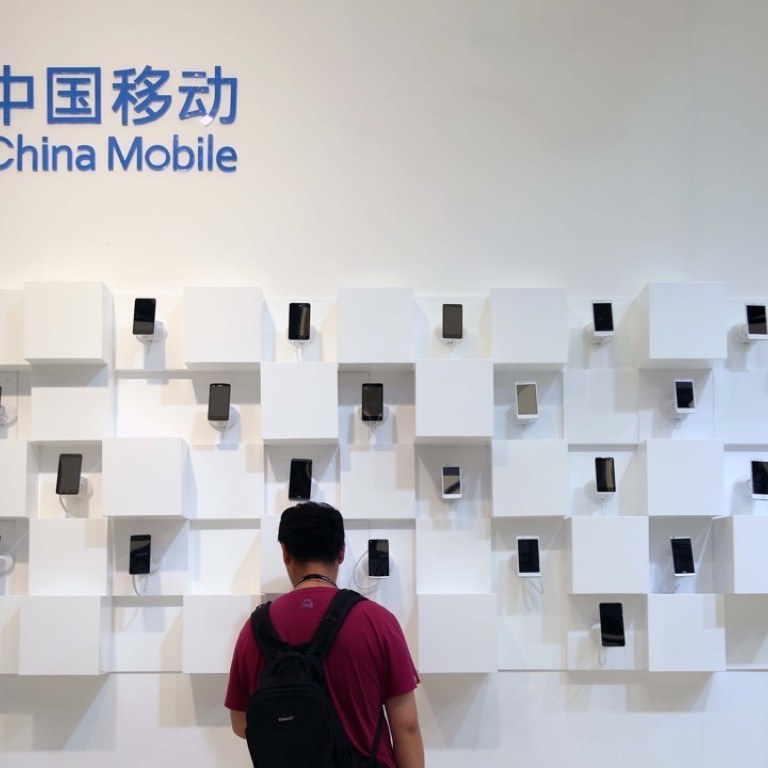
Why the US government sees China Mobile as a national security threat
The application of China Mobile, the world’s largest wireless network operator by subscribers, to build its own telecoms network in the US was denied by the Trump administration
Trade frictions between the United States and China may have escalated on Monday after a US government agency identified China Mobile, the world’s largest wireless network operator by subscribers, as a national security threat.
The National Telecommunications and Information Administration (NTIA), an agency under the US Department of Commerce, said China Mobile posed a security risk in its recommendation that the Federal Communications Commission (FCC) deny the Hong Kong-listed network operator’s application to build its own infrastructure and provide consumer and corporate telecommunications services in the US.
“After significant engagement with China Mobile, concerns about increased risks to US law enforcement and national security interests were unable to be resolved,” the NTIA said in a statement about the mainland firm’s 2011 application to the FCC.
That represented the first time a Chinese telecommunications network operator had been singled out as a security threat in the US. American lawmakers had previously identified ZTE Corp and Huawei Technologies, two of the world’s biggest telecoms equipment manufacturers, as companies that posed risks to national security because of alleged ties to the Chinese government.
China Mobile and China Unicom did not immediately respond to inquiries about the NTIA statement.
A spokesman for China Telecom said the company “does not see any impact on its US operations so far”.
The news immediately made an impact on China Mobile’s shares, which fell 2 per cent to HK$63.80 in Hong Kong trading on Tuesday to mark the stock’s biggest percentage decline in three weeks. The benchmark Hang Seng Index slid 1.4 per cent on the same day.
Here are a few things to know about China Mobile:
1. What licence did China Mobile apply for in the US?
China Mobile, whose shares also trade on the New York Stock Exchange, had applied for a Section 214 facilities-based licence, which would give it the authority to build its own telecommunications network in the US, connect this network to those run by domestic operators, and offer mobile, broadband and other telecoms services to consumers and commercial enterprises in the country.
Neither Unicom nor China Telecom had applied for such a licence in the US, according to Jefferies equity analyst Edison Lee.
“There had been plenty of back and forth over the years between the US regulator and China Mobile about the operator’s plans for such a facilities-based license in the country,” said Lee. “China Mobile was not able to satisfy these inquiries, which led to the decision to deny its application after seven years.”
Officials from the Federal Bureau of Investigation, the Department of Homeland Security and the Justice Department’s national security division – also known as “Team Telecom” – were concerned that the move would give the company access to physical infrastructure and internet traffic that might allow China to spy more easily on the US government and steal intellectual property from American companies, according to a Los Angeles Times report in 2012.
2. What services are provided by China Mobile?
On the mainland, China Mobile provides a range of mobile voice, data and fixed-line broadband services, as well as so-called internet of things smart connected devices operations. The company also provides data centre services to corporate clients. Its full portfolio of services is offered in all 31 provinces and autonomous regions on the mainland, and Hong Kong.
The company had 901.9 million mobile subscribers, 671.8 million of which are on its 4G network, as of May 31. It also had 130.4 million fixed-line broadband subscribers in the same period.
China Mobile, Unicom and China Telecom are projected to lead the rapid development of 5G mobile services on the mainland from next year, with total infrastructure investments estimated to reach 1.2 trillion yuan by 2025, according to data from a study published last year by the China Academy of Information and Communications Technology, the research arm of the Ministry of Industry and Information Technology.
3. Who controls China Mobile?
China Mobile, which was incorporated in Hong Kong in September 1997, has Beijing-based China Mobile Communications Group as its controlling shareholder.
The state-owned group owned 72.7 per cent of China Mobile’s total issued shares as of December 31, while the rest was held by public investors.

